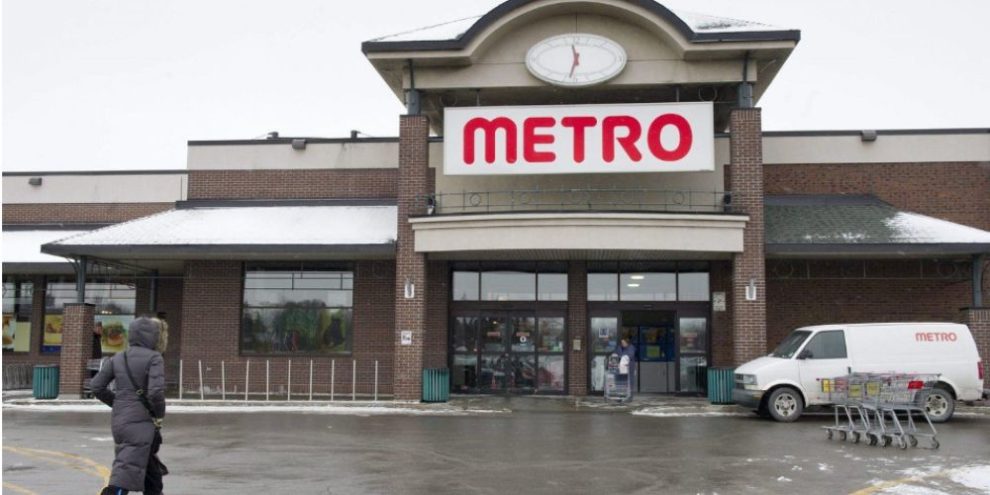
By Rosa Saba in Montreal
Price increases will start coming to Metro Inc. grocery stores as soon as next week after an industry-wide blackout period on supplier price increases comes to an end, CEO Eric La Flèche said Tuesday.
"We are negotiating as best we can and delaying as much as we can some of the increases requested by our suppliers," La Flèche told a virtual news conference.
"Unfortunately, there will be some prices starting to go up."
La Flèche said one product that Metro shoppers will pay more for is orange juice, because of problems with orange crops.
"That one's going to be substantial," he said. "We're clearly going to be selling a lot less orange juice."
However, La Flèche offered some hope for future stability, saying the number of requests for price increases by suppliers is down substantially from the highs of last year and the year before.
"So that's good news," he said. "And the size of the demands is coming back to more normal levels."
The comments came as the grocery and drugstore retailer reported a first-quarter profit of $228.5 million, with sales up 6.5 per cent.
Metro said its profit amounted to 99 cents per diluted share for the quarter ended Dec. 23 compared with a profit of $231.1 million or 97 cents per diluted share a year earlier when the company had more shares outstanding.
Sales totalled $4.97 billion, up from $4.67 billion in the same quarter a year earlier, which ended on Dec. 17, 2022.
Same-store sales for food were up 6.1 per cent, helped in part by the timing of the end of the quarter relative to Christmas. Adjusting for the Christmas week shift, Metro said same-store sales for food were up 3.4 per cent. Same-store sales for pharmacy goods were up 3.9 per cent.
La Flèche said Metro's discount store banners continued to fuel growth, while the company's private-label brands are reaching record penetration levels.
The company opened nine new discount stores in Quebec and Ontario over the last 15 months and another four are scheduled to open this fiscal year, he told analysts on a call Tuesday afternoon.
Grocery inflation in Canada has been moderating under the weight of interest rate hikes, but is still elevated at 4.7 per cent in December.
Metro's internal measure of inflation at its stores was below that in its latest quarter at four per cent, said La Flèche, and down from the previous quarter.
Metro isn't the only grocer facing price increase requests from suppliers. Loblaw and Empire have said that some of the biggest suppliers are coming to them with unjustifiable price increases.
Some of the demands Metro is receiving are "too high and hard to justify," said La Flèche, causing tension in negotiations. The grocer hasn't reached a point where it will stop selling these products, he added, but it sometimes makes other adjustments instead, such as reducing how much it sells of a certain product.
The grocers have been under political pressure to stabilize food prices, with Industry Minister François-Philippe Champagne calling on executives in the fall to create plans or face consequences.
This week, Champagne said in a letter to the competition commissioner that the large grocers haven't been transparent enough about the causes of food inflation, "and they have failed, for the most part, to provide regular updates on initiatives aimed at stabilizing food prices in the country."
He suggested that a follow-up be done to the Competition Bureau's study last year into the Canadian grocery sector, now that the bureau has new powers to get more information from companies.
La Flèche said Metro "collaborated fully and transparently" with the Competition Bureau for its study. He also noted the grocer appeared three times before the House of Commons committee studying food prices to answer questions from MPs.
In its outlook, Metro continued to say it expected significant headwinds in 2024 with the launch of its automated distribution centre in Terrebonne, Que., and the launch of the final phase of its automated fresh produce plant in Toronto next spring.
It says it expects some temporary duplication of costs and learning curve inefficiencies, as well as higher depreciation and lower capitalized interest.
The company maintained its guidance for operating income before depreciation and amortization to grow by less than two per cent and adjusted net earnings per share to be flat to down 10 cents in its 2024 financial year compared with 2023.
"We expect to return to historical earnings growth after fiscal 2024," said La Flèche at the company's Annual General Meeting Tuesday morning.
On an adjusted basis, Metro says it earned $1.02 per diluted share, up from an adjusted profit of $1 per share a year earlier.
Metro said Tuesday it will pay a quarterly dividend of 33.5 cents per share, up from 30.25 cents per share.
Metro shares were down 1.3 per cent in mid-afternoon trading on the Toronto Stock Exchange, at $70.30.
— With files from Nojoud Al Mallees in Toronto
Banner image: THE CANADIAN PRESS/Paul Chiasson
This report by The Canadian Press was first published Jan. 30, 2024.
Companies in this story: (TSX:MRU)





